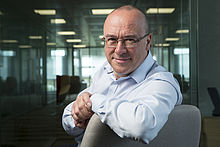Christopher Bishop
Chris Bishop | |
|---|---|
 Chris Bishop in 2015 | |
| Born | Christopher Michael Bishop 7 April 1959[4] |
| Alma mater |
|
| Known for | Pattern Recognition and Machine Learning (PRML) book |
| Awards |
|
| Scientific career | |
| Fields | Machine learning[2] |
| Institutions | |
| Thesis | The semi-classical technique in field theory: some applications (1983) |
| Doctoral advisor | David Wallace[3] |
| Doctoral students | Danielle Belgrave |
| Website | research |
Christopher Michael Bishop (born 7 April 1959)[4] FRS FRSE FREng[5] is the Laboratory Director at Microsoft Research Cambridge, Professor of Computer Science at the University of Edinburgh and a Fellow of Darwin College, Cambridge.[6]
Education
Chris obtained a Bachelor of Arts degree in Physics from St Catherine's College, Oxford, and a PhD in Theoretical Physics from the University of Edinburgh, with a thesis on quantum field theory supervised by David Wallace.[4][3]
Research and career
Bishop's research investigates machine learning[5] by allowing computers to learn from data and experience.[6][7][8] His doctoral students include Neil Lawrence.[9][10]
Awards and honours

Bishop was awarded the Tam Dalyell prize in 2009[11] and the Rooke Medal from the Royal Academy of Engineering in 2011.[12] He gave the Royal Institution Christmas Lectures in 2008[1] and the Turing Lecture in 2010. Bishop was elected a Fellow of the Royal Academy of Engineering (FREng) in 2004,[13] a Fellow of the Royal Society of Edinburgh (FRSE) in 2007,[14] and Fellow of the Royal Society (FRS) in 2017.[5]
References
- ^ a b 2008 Royal Institution Christmas Lectures
- ^ Christopher Bishop publications indexed by Google Scholar
- ^ a b Bishop, Christopher Michael (1983). The semi-classical technique in field theory : some applications (PhD thesis). University of Edinburgh. hdl:1842/11984. OCLC 59284998. EThOS uk.bl.ethos.346542.

- ^ a b c d Anon (2015). "BISHOP, Prof. Christopher Michael". Who's Who (online Oxford University Press ed.). A & C Black. doi:10.1093/ww/9780199540884.013.249776.
{{cite encyclopedia}}: More than one of|surname=and|author=specified (help); Unknown parameter|othernames=ignored (help) (Subscription or UK public library membership required.) (subscription required) - ^ a b c Anon (2017). "Christopher Bishop". royalsociety.org. London: Royal Society.
- ^ a b "Microsoft Research Cambridge".
- ^ Bishop, Christopher Michael (1995). Neural Networks for Pattern Recognition. Oxford University Press. ISBN 9780198538646.
- ^ Tipping, Michael E.; Bishop, Christopher M. (1999). "Probabilistic Principal Component Analysis". Journal of the Royal Statistical Society, Series B. 61 (3): 611–622. CiteSeerX 10.1.1.35.2022. doi:10.1111/1467-9868.00196. ISSN 1369-7412.
- ^ Lawrence, Neil (2001). Variational inference in probabilistic models (PhD thesis). University of Cambridge.
- ^ Christopher Bishop at the Mathematics Genealogy Project
- ^ Tam Dalyell Prize
- ^ Royal Academy of Engineering, Rooke Medal
- ^ "Royal Academy of Engineering". Retrieved 1 February 2018.
- ^ "Professor Christopher M Bishop FREng FRSE, FRS - The Royal Society of Edinburgh". The Royal Society of Edinburgh. Retrieved 1 February 2018.
- 1959 births
- Living people
- British physicists
- British computer scientists
- Computer science educators
- Alumni of St Catherine's College, Oxford
- Alumni of the University of Edinburgh
- Academics of the University of Edinburgh
- Academics of Aston University
- Fellows of the British Computer Society
- Fellows of Darwin College, Cambridge
- Fellows of the Royal Academy of Engineering
- Fellows of the Royal Society of Edinburgh
- Fellows of the Royal Society
- Microsoft employees
- Computer science writers
